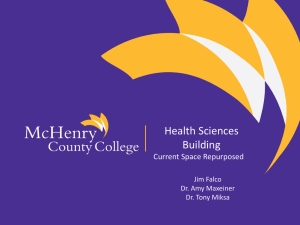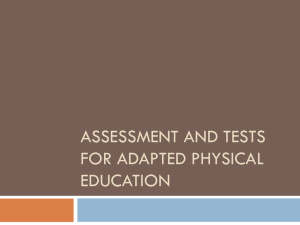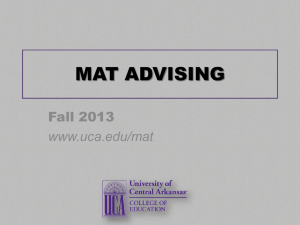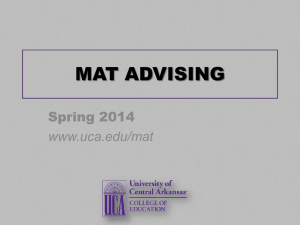Courses - Università degli Studi di Trento
advertisement
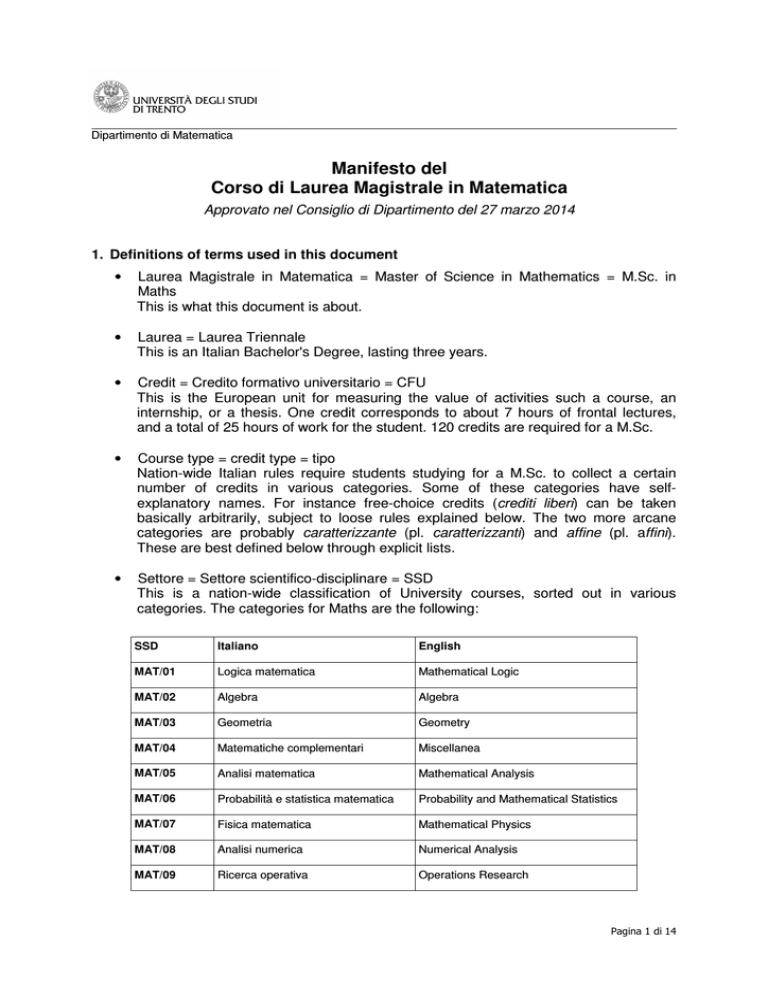
Dipartimento di Matematica Manifesto del Corso di Laurea Magistrale in Matematica Approvato nel Consiglio di Dipartimento del 27 marzo 2014 1. Definitions of terms used in this document • Laurea Magistrale in Matematica = Master of Science in Mathematics = M.Sc. in Maths This is what this document is about. • Laurea = Laurea Triennale This is an Italian Bachelor's Degree, lasting three years. • Credit = Credito formativo universitario = CFU This is the European unit for measuring the value of activities such a course, an internship, or a thesis. One credit corresponds to about 7 hours of frontal lectures, and a total of 25 hours of work for the student. 120 credits are required for a M.Sc. • Course type = credit type = tipo Nation-wide Italian rules require students studying for a M.Sc. to collect a certain number of credits in various categories. Some of these categories have selfexplanatory names. For instance free-choice credits (crediti liberi) can be taken basically arbitrarily, subject to loose rules explained below. The two more arcane categories are probably caratterizzante (pl. caratterizzanti) and affine (pl. affini). These are best defined below through explicit lists. • Settore = Settore scientifico-disciplinare = SSD This is a nation-wide classification of University courses, sorted out in various categories. The categories for Maths are the following: SSD Italiano English MAT/01 Logica matematica Mathematical Logic MAT/02 Algebra Algebra MAT/03 Geometria Geometry MAT/04 Matematiche complementari Miscellanea MAT/05 Analisi matematica Mathematical Analysis MAT/06 Probabilità e statistica matematica Probability and Mathematical Statistics MAT/07 Fisica matematica Mathematical Physics MAT/08 Analisi numerica Numerical Analysis MAT/09 Ricerca operativa Operations Research Pagina 1 di 14 • Curriculum (pl. curricula) Within the general framework of the M.Sc. in Mathematics, it is possible to aim at gaining an in-depth knowledge and understanding of several areas of advanced Mathematics (curriculum Advanced Mathematics) or to aim more at acquiring knowledge useful for teaching and communicating mathematics and other sciences (curriculum Teaching and Scientific Communication) or to specialize in one of the curricula of Mathematics for Life Sciences or in Cryptography and Coding Theory Each curricula will have different rules in the choice of courses: see below. • Piano degli studi = piano di studio = piano di studi = study plan Each student of the Laurea Magistrale has to spell out the choices she or he is taking among the various course on offer in a document with this name. (The plural of piano is piani). • Orientamento =suggested study plan Examples of possible study plans centered on different aspects of mathematical studies. • Stage: the Italian term (actually borrowed from French) for an internship. • Semestre (pl. semestri) = semester = sem Teaching is arranged in two periods, conventionally called semesters = six months, although they last only about 14 weeks each. The first semestre starts in midSeptember and ends about a week before the end of December. The second semestre lasts from mid-February to the end of May/beginning of June. • MUT = Mutuato = Corso mutuato This is a course which is offered by a different Department or is a proxy for a course held in a different Department. • N.A. = Not Available = Non attivato A course that has been active in previous years, and may well be active again in the future, but is not currently offered. 2. “Istituzione e attivazione” The Department of Mathematics promotes the Corso di Laurea Magistrale in Matematica (Master of Science in Mathematics), belonging to the class “LM-40 - Matematica”. The degree is activated starting from the Academic Year 2009/10 through the insertion in the Database of the Offerta Formativa. 3. Instruction language All courses of the Laurea Magistrale in Mathematics are taught in English. 4. Goals The Master of Science in Mathematics (“Laurea Magistrale in Matematica”) is aimed at providing an in-depth knowledge and understanding of several areas of advanced Mathematics, and of its relations to other Sciences. 5. Admission requirements To apply to the Laurea Magistrale in Matematica, a student shall fulfill both some formal requirements and a satisfactory personal qualification. As far as the first step is concerned, a Bachelor's degree lasting for three years or longer is required; such a degree must provide at least the basic concepts of linear algebra and mathematical analysis. A certificate for a B1 level of English is also required. Pagina 2 di 14 The personal qualification is evaluated by a Commissione, designated by the Council of the Mathematical Department; the following information is required - a detailed study plan of the Bachelor's degree, including titles and syllabi of all the courses taken; - a document issued from the University that issued the Bachelor's degree reporting, in Italian or English, the list of courses, the score obtained in each of them and the final score associated to the degree; - work and professional experiences; - level of knowledge of English Language, certified by internationally recognized organizations or by the University that issued the Bachelor's degree; - a motivation statement, explaining why the student is willing to apply to the Corso di Laurea Magistrale in Matematica, and what he/she expects from it. In particular, formal requirements are automatically satisfied by students who possess • Laurea in Matematica (classe “L-35 – Scienze matematiche”). • Lauree affini, for instance a Bachelor's Degree (Laurea) in Physics, Computer Science, Engineering or Economics, with a suitable number of credits in the settori MAT/*. The committee can require a personal interview (possibly on-line) with the applicants, to better evaluate their curriculum. Some students might be required to follow a particular piano degli studi (study plan). 6. Piano degli studi Students have to submit a piano degli studi (study plan), which satisfies the requisites for one of the four curricula spelled out below. Such a piano is subject to approval by the Commissione Didattica di Dipartimento. Students are not allowed to repeat activities already taken in their earlier career. To write a proper piano, a total of 120 credits have to be chosen in the following categories: caratterizzanti, affini and liberi (see below for a short description and the following pages for a list of possible courses for each kind). 7. Crediti caratterizzanti Depending on the curriculum, whose rules are spelled out below, the students have to select a certain number of crediti caratterizzanti, which correspond to certain core Mathematics courses in two groups of settori. A list of such courses is given for each curriculum below. 8. Crediti affini Depending on the curriculum, whose rules are spelled out below, the students have to select a certain number of crediti affini. A list of settori whose credits are considered affini is given below. Note that all Mathematics courses are affini. Note also that students can take Mathematics courses at the Laurea Magistrale in Matematica of the Università di Verona as affini courses. Also, once the proper number of crediti caratterizzanti has been chosen, the student can select more caratterizzanti courses under the affini label. 9. Crediti liberi/free-choice credits In the piano degli studi students can select any course offered at the University of Trento for their free-choice credits (crediti liberi), subject to approval by the Commissione Didattica di Dipartimento. Students are required to give a detailed motivation for these choices in the piano di studi. Note that further caratterizzanti and affini courses can be taken under this label. Note also that students can take Mathematics courses at the Laurea Magistrale in Matematica of the Università di Verona as liberi courses. Pagina 3 di 14 10. Language Skills Students are required to get a B2 (or higher) certificate of English for 3 credits of Language Skills. Students who have already used such a certification earlier in their career may alternatively get these 3 credits by getting a course in Technical English Language (level B2 advanced) at CLA. 11. Stage/Internship and Thesis/tesi Several internships at companies and institutions are available. An internship has a default credit value of 12. In this case, the thesis has a credit value of 18. Students can otherwise choose to write a thesis for 30 credits. Detailed information and further regulation are provided in the description of each curriculum. 12. “Curriculum” The course is organized into four curricula: • Advanced Mathematics; • Teaching and Scientific Communication; • Mathematics for Life Sciences; • Coding Theory and Cryptography. Every students is required to formally choose one of the curricula and to follow the corresponding rules as stated in the Regolamento Didattico della Laurea Magistrale (http://www.unitn.it/dmath/25156/norme-e-regolamenti) Within each curriculum, we propose particular study plans (called orientamenti) which are suggested to the students; such orientamenti are automatically approved. Students have the opportunity to write a personal study plan within each curriculum: such plan is subject to approvation by the Commissione Didattica. Pagina 4 di 14 The curriculum Advanced Mathematics A consistent study plan in this curriculum will adhere to the following rules: Caratterizzanti courses: a. at least 24 credits in the settori MAT/01-05 among which at least 15 credits shall be taken in the first table: Course Code CFU Hours SSD Semester Teacher Advanced Analysis 145129 9 63 MAT/05 2 Francesco Serra Cassano Advanced Geometry 145130 9 63 MAT/03 1 Roberto Pignatelli Computational Algebra 145135 6 42 MAT/02 1 Willem de Graaf other courses that can be taken as caratterizzanti in the settori MAT/01-05 are: Course Code CFU Hours SSD Semester Teacher Mathematical Logic 145146 6 42 MAT/01 1 Stefano Baratella Algebraic Geometry I 145131 6 42 MAT/03 1 Marco Andreatta Coding Theory and Applications 145394 6 42 MAT/02 1 Massimiliano Sala Partial Differential Equations 145393 9 63 MAT/05 2 Augusto Visintin b. at least 15 credits in caratterizzanti courses of the settori MAT/06-09 Course Code CFU Hours SSD Semester Teacher Stochastic Processes 145435 9 63 MAT/06 1 Luciano Tubaro Mathematical Physics 145147 9 63 MAT/07 2 Enrico Pagani Numerical Methods for PDE 145152 6 48 MAT/08 2 Ana Maria Alonso Rodriguez Affini courses: At least 36 credits shall be taken from in affini courses, including at least 24 credits in settori MAT/* or FIS/* offered by the Master's Degree in Mathematics of the University of Trento or by the Master's Degree in Mathematics of the University of Verona (as set by Art. 5 of the Regolamento). In particular, the following courses can be taken as affini courses: Course Code CFU Hours SSD Semester Teacher Algebraic Geometry II 145132 6 42 MAT/03 2 Geometric measure theory 145258 6 42 MAT/03 N.A. Integral Transform 145143 6 42 MAT/05 N.A. Mathematical Control Theory 145259 6 42 MAT/05 N.A. Model Theory 145407 6 42 MAT/01 N.A. Set Theory 145156 6 42 MAT/01 2 Stefano Baratella Cryptography 145321 6 42 MAT/02 1 MUT (mutuated as a part of Algebraic Cryptography – modulo Cryptography (Cod. 145441) Claudio Fontanari Gianluca Occhetta Pagina 5 di 14 Further, every course offered by a Master’s Degree of the University of Trento or by the Master's Degree in Mathematics of the University of Verona (as set by Art. 5 of the Regolamento) in the following or settori affini list in Tab 1 can be taken: Tab. 1: list of settori affini BIO/* Biologia FIS/* Fisica ICAR/01 Idraulica ICAR/02 Costruzioni idrauliche e marittime e idrologia ICAR/07 Geotecnica INF/01 Informatica ING-IND/* Ingegneria Industriale ING-INF/* Ingegneria Informatica MAT/* Matematica MED/01 Statistica medica SECS-P/* Economia SECS-S/* Statistica Corsi liberi (free courses): Students shall choose courses for 12 credits, among all the courses offered by the University of Trento or by the Master's Degree in Mathematics of the University of Verona as stated in Art. 5 of the Regolamento. Such courses shall be consistent with the selected curriculum and shall not repeat contents already provided by other courses or in the Bachelor’s degree. Language skills: 3 credits, as ruled out by the Regolamento and specified above. Thesis and stage: The course of studies is concluded with the discussion of a Master Thesis. The process leading to write the thesis can be divided into one of the following ways: a. an original thesis, carried out with the guidance of a supervisor, which provides 30 credits; b. an internship / placement, which assigns 12 CFU, followed by an original thesis, carried out under the guidance of a supervisor, who provides 18 credits. Approximately the length of the Master's Thesis (including the possible internship) is equivalent to one semester of full-time work (25 hours x 30 credits). Pagina 6 di 14 The curriculum Mathematics for Life Sciences Students are invited to choose between the following options, which are called orientamenti in italian: - Modelling, Statistics and Analysis of Biosystems - Modelling and Simulation for Biomedical Applications It is also possible for a student to present a personal study plan that may cover applications of mathematics to different fields such as finance, economics, engineering or others. Such a study plan is subject to approval by the Commissione Didattica of the Department. Modelling, Statistics and Analysis of Biosystems An introduction to modern mathematical methods in areas of biology as ecology, epidemiology, molecular networks. Caratterizzanti courses: Course Code CFU Hours SSD Year/Sem. Teacher Fourier Analysis 145434 6 42 MAT/05 1/1 Augusto Visintin Mathematical Biology 145145 9 63 MAT/05 1/1 Andrea Pugliese Statistics of Stochastic Processes 145256 6 42 MAT/06 2/1 Andrea Pugliese Stochastic Processes 145435 9 63 MAT/06 1/1 Luciano Tubaro Numerical Methods for PDE 145152 6 48 MAT/08 1/2 Ana Maria Alonso Rodriguez Scientific computing 145427 9 72 MAT/08 1/2 Michael Dumbser One among: Una parte del corso viene svolta in condivisione con l’insegnamento di Modellistica ambientale - DICAM (0332H Cod. 140230) Affini courses: Statistical models 145333 3 24 MAT/06 1/2 Melissa Morine Data analysis and exploration 145136 6 48 INF/01 1/2 Melissa Morine Modelling and simulation of biological systems 145387 9 63 INF/01 1/2 Corrado Priami Introduction to Cell Biology 145389 9 70 BIO/13 1/1 MUT DISI (0517H Cod. 145389) One course to choose among: Advanced Topics in biomathematics 145133 6 42 MAT/06 1/2 Da definire Laboratory of biological data mining 145053 6 48 INGINF/05 2/1 MUT DISI (0517H Cod. 145053) Pagina 7 di 14 One course to choose: the one not chosen above or in the following list: Partial Differential Equations 145393 9 63 MAT/05 1/2 Augusto Visintin Stochastic Differential Equations 145159 6 42 MAT/06 1/2 Stefano Bonaccorsi Mathematical aspects of bioelectromagnetism and imaging 145331 6 42 MAT/08 2/1 N.A. Machine learning 145062 6 48 INF/01 1/1 MUT DISI (0517H Cod. 145062) Liberi courses: Students are suggested to take the free courses among those listed before. For students missing some prerequisites in mathematical analysis or probability theory, it is possible to include appropriate courses (in Italian) from Bachelor’s degree (Laurea triennale) among free-choice courses. Language skills: 3 credits, as ruled out by the Regolamento and specified above. Modelling and Simulation for Biomedical Applications A study plan yielding competences in mathematics, scientific computation, physics, physiology, applicable to a range of disciplines in medicine, pharmaceutical industry, sanitary services Caratterizzanti courses: Course Code CFU Hours SSD Year/Sem. Teacher Fourier Analysis 145434 6 42 MAT/05 1/1 Augusto Visintin Mathematical Biology 145145 9 63 MAT/05 1/1 Andrea Pugliese Numerical Methods for PDE 145152 6 48 MAT/08 1/2 Ana Maria Alonso Rodriguez Scientific computing 145427 9 72 MAT/08 1/2 Michael Dumbser Una parte del corso viene svolta in condivisione con l’insegnamento di Modellistica ambientale - DICAM (0332H Cod. 140230) Mathematical aspects of bioelectromagnetism and imaging 145331 6 42 MAT/08 2/1 N.A. Affini courses: Pagina 8 di 14 Course Code CFU Hours SSD Year/Sem. Teacher Statistical models 145333 3 24 MAT/06 1/2 Melissa Morine Theoretical biomechanics 145332 9 70 ICAR/01 1/1-2 Davide Bigoni Giorgio Rosatti Physiological flow and transport in porous tissues 145392 6 42 ICAR/02 2/2 Alberto Bellin Bio-Medical Imaging 145338 6 48 FIS/07 1/2 MUT (0518H cod. 145338) Molecular and Cellular Biophysics 145235 6 48 BIO/10 1/1 MUT (0518H cod. 145235) Computational haemodynamics 145428 9 63 MAT/08 2/1 Eleuterio Toro Liberi courses: students are strongy encouraged to choose the following: Partial Differential Equations 145393 9 63 MAT/05 1/2 Augusto Visintin Biomedical Applications of Mathematics 145429 3 21 MAT/08 2/1 Alberto Valli Language skills: 3 credits, as ruled out by the Regolamento and specified above. Thesis and stage: The course of studies is concluded with the discussion of a Master Thesis. The process leading to write the thesis can be divided into one of the following ways: a. an original thesis, carried out with the guidance of a supervisor, which provides 30 credits; b. an internship / placement, which assigns 12 CFU, followed by an original thesis, carried out under the guidance of a supervisor, who provides 18 credits. Approximately the length of the Master's Thesis (including the possible internship) is equivalent to one semester of full-time work (25 hours x 30 credits). Pagina 9 di 14 The curriculum Coding Theory and Cryptography In this highly specialized curriculum, the students will receive an introduction to modern methods in Computational Algebra, with an emphasis on its main real-life applications: Coding theory and Cryptography According to their own inclination, the students are free to choose between two options, which are called orientamenti in Italian, the stage-oriented curriculum and the researchoriented curriculum. It remains possible for a student to choose a personal study plane, which is however subject to approval by the Department and which needs a strong motivation behind. Stage-oriented This orientamento is especially aimed at students who wish to work in the security department of a company. Typically, security departments of banks hire our graduates, but also IT companies and security-focused firms find their study preparation of high interest. Indeed, this orientamento complements a solid algebraic background with both applied courses, such as Cryptography or Coding Theory and Applications, and practical Computer Science courses, such as Java programming (Programmazione II) or Network Security. An internship is mandatory to graduate. The internship can be either external in a company or internal within the Laboratory of Cryptography on a project proposed by a company. 39 credits in caratterizzanti courses: Course Code CFU Hours SSD Year/Sem. Computational Algebra 145135 6 42 MAT/02 1/1 Willem de Graaf Coding Theory and Applications 145394 6 42 MAT/02 1/1 Massimiliano Sala Algebraic Cryptography 145441 12 84 MAT/02 Modulo Cryptography (6 crediti) Modulo Finite Fields and Symmetric Cryptography(6 crediti) Teacher Massimiliano Sala 1/1 1/2 Stochastic Processes (I modulo) 145157 6 42 MAT/06 1/1 MUT (mutuated as a part of Stochastic Processes (Cod. 145435) Scientific computing 145427 9 72 MAT/08 1/2 Michael Dumbser Una parte del corso viene svolta in condivisione con l’insegnamento di Modellistica ambientale - DICAM (0332H Cod. 140230) 36 credits in affini courses, among which 30 credits from the following list: Data Hiding 145192 6 48 INGINF/03 1 Mut. DISI 0335H – cod. 140122) Network Security 145065 6 48 INGINF/05 2 Mut. DISI 0517H – cod. 145065) Formal Technique for Cryptographic Protocol Analysis 145396 6 42 INF/01 1/2 Computability and computational complexity 145451 6 48 MAT/01 1 Statistics of Stochastic Processes 145256 6 42 MAT/06 2/1 Roberto Zunino Mut. DISI 0517H – cod. 145451) Andrea Pugliese Pagina 10 di 14 at least one from the following list: Discrete Fourier Analysis 145212 6 42 Advanced Coding Theory and Cryptography 145395 12 84 Modulo Advanced Coding Modulo Theory and Cryptography MAT/02 2 / -- N.A. 2 / 1-2 MAT/02 MAT/03 Massimiliano Sala Edoardo Ballico Security Engineering 145298 6 48 INGINF/05 1 Mut. (DISI 0517H – cod. 145298) Digital signal processing 145190 6 48 INGINF/03 1 Mut. (DISI 0335H – cod. 145124) Corsi liberi (free courses): To complement the preparation in this orientamento, students who have not attended courses focused on Java programming in the Bachelor’s degree are highly recommended to take the course Programmazione 2 145019 6 48 INF/01 2 Mut. (DISI 0514G – Linguaggi di programmazione mod. 1 cod. 145413) To complement the preparation in this orientamento, students are recommended to choose other free courses among the courses in settori MAT/02-03 (also from the Bachelor’s degree) and, especially, Algebra Commutativa (MAT/03 – 6 CFU) and Teoria di Galois (MAT/02 – 6 CFU) are particularly suggested Language skills: 3 credits, as ruled out by the Regolamento and specified above. Thesis and stage: The course of studies is concluded with the discussion of a Master Thesis. The process leading to write the thesis consists of an internship / placement, which assigns 12 CFU, followed by an original thesis, carried out under the guidance of a supervisor, who provides 18 credits. Approximately the length of the Master's Thesis (including the internship) is equivalent to one semester of full-time work (25 hours x 30 credits). Research-oriented This orientamento is aimed especially at students interested in mathematics research in Applied Algebra, with focus on Cryptography and Coding Theory, and willing to pursue a PhD in Mathematics on these subjects. No internship is possible in this orientamento, since its students are expected to defend a research thesis presenting some original results. 39 credits in caratterizzanti courses: Course Code CFU Hours SSD Year/Sem. Computational Algebra 145135 6 42 MAT/02 1/1 Willem de Graaf Coding Theory and Applications 145394 6 42 MAT/02 1/1 Massimiliano Sala Algebraic Cryptography 145441 12 84 MAT/02 Modulo Cryptography (6 crediti) Modulo Finite Fields and Symmetric Cryptography(6 crediti) Teacher Massimiliano Sala 1/1 1/2 Pagina 11 di 14 Stochastic Processes Statistics of Stochastic Processes 145435 145256 9 63 MAT/06 1/1 Luciano Tubaro 6 42 MAT/06 2/1 Andrea Pugliese 36 credits in affini courses, taking all the courses in the following list: Advanced Coding Theory and Cryptography 145395 12 84 Modulo Advanced Coding Modulo Theory and Cryptography 2 / 1-2 MAT/02 MAT/03 Massimiliano Sala Edoardo Ballico Discrete Fourier Analysis 145212 6 63 MAT/02 2 / -- N.A. Algebraic Geometry I 145131 6 42 MAT/03 1/1 Marco Andreatta Formal Technique for Cryptographic Protocol Analysis 145396 6 42 INF/01 1/2 Roberto Zunino The remaining 6 credits can be taken from courses in settori MAT/* offered by the Department of Mathematics of the University of Trento. Corsi liberi (free courses): To complement the preparation in this orientamento, students are highly recommended to choose the free courses among the courses in settori MAT/02-03 (also from the Bachelor’s degree) and, especially, Algebra Commutativa (MAT/03 – 6 CFU) and Teoria di Galois (MAT/02 – 6 CFU) are particularly suggested. Language skills: 3 credits, as ruled out by the Regolamento and specified above. Thesis and stage: The course of studies is concluded with the discussion of a Master Thesis. The process leading to write the thesis requires the preparation of an original thesis, carried out with the guidance of a supervisor, which provides 30 credits. Approximately the length of the Master's Thesis is equivalent to one semester of full-time work (25 hours x 30 credits). Pagina 12 di 14 The curriculum Teaching and Scientific Communication A consistent study plan in this curriculum will adhere to the following rules: Caratterizzanti courses: 30 credits in the settori MAT/01-05 among which at least 18 credits in the following list Course Code CFU Hours SSD Year/Sem. Foundations of Analysis 145142 6 42 MAT/05 1 Fabio Bagagiolo Foundations of Geometry 145253 6 42 MAT/03 2 Lucia Beretta Elementary Mathematics from a higher Viewpoint I 145149 6 42 MAT/04 1 Lucia Beretta Elementary Mathematics from a higher Viewpoint II 145150 6 42 MAT/04 2 N.A. Laboratory of Didactics of Mathematics 145144 6 42 MAT/04 1 N.A. 145154 6 42 MAT/04 2 Silvano Delladio Experimental Mathematics Laboratory at School Level Teacher The remaining credits can be taken from caratterizzanti courses (settori MAT/01-05) of the other curricula. The following course is mandatory: Course Mathematical models for the Physical, Natural and Social Sciences Code CFU Hours SSD Year/Sem. 145151 6 42 MAT/06 1 Code CFU Hours SSD Year/Sem. 145155 12 84 Teacher Stefano Bonaccorsi 36 credits in affini courses: The following course is mandatory: Course Modern Physics FIS/08 1 Teacher Stefano Oss at least 12 credits from the following list: Course Code CFU Hours SSD Year/Sem. Experimental Physics Laboratory at High School Level I 145153 Experimental Physics Laboratory at High School Level II 145215 Modern Physics Teacher 6 56 FIS/08 1 Da definire 6 56 FIS/08 2 Mut. (Fisica 0518H cod. 145215) 145155 12 84 FIS/08 1 Stefano Oss Didactics of Computer Science 145211 6 42 INF/01 2 Luisa Mich Physical Science Communication and teaching Methods 6 56 FIS/08 2 145193 Mut. (Fisica 0518H cod. 145193) Pagina 13 di 14 The remaining credits can be taken from courses in settori MAT/* or FIS/* offered by the University of Trento or by the Master's Degree in Mathematics of the University of Verona (as set by Art. 5 of the Regolamento) or in settori affini listed in Tab. 2 above or in the following additional areas: Tab. 2: list of further settori affini for the curriculum Teaching and scientific communication M-FIL/02 Logica e filosofia della scienza M-FIL/05 Filosofia e teoria dei linguaggi M-PED/01 Pedagogia generale e sociale M-PED/02 Storia della pedagogia M-PED/03 Didattica e pedagogia speciale M-PED/04 Pedagogia sperimentale M-PSI/01 Psicologia generale M-PSI/02 Psicobiologia e psicologia fisiologica M-PSI/03 Psicometria M-PSI/04 Psicologia dello sviluppo e psicologia dell'educazione Corsi liberi (free courses): Students shall choose courses for 15 credits, among all the courses offered by the University of Trento or by the Master's Degree in Mathematics of the University of Verona as stated in Art. 5 of the Regolamento. Such courses shall be consistent with the selected curriculum and shall not repeat contents already provided by other courses or in the Bachelor’s degree. Language skills: 3 credits, as ruled out by the Regolamento and specified above. Thesis and stage: The course of studies is concluded with the discussion of a Master Thesis. The process leading to write the thesis can be divided into one of the following ways: a. an original thesis, carried out with the guidance of a supervisor, which provides 30 credits; b. an internship / placement, which assigns 12 CFU, followed by an original thesis, carried out under the guidance of a supervisor, who provides 18 credits. Approximately the length of the Master's Thesis (including the possible internship) is equivalent to one semester of full-time work (25 hours x 30 credits). Pagina 14 di 14



